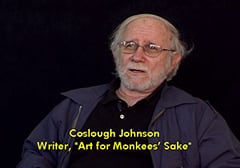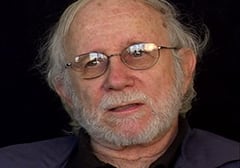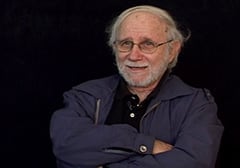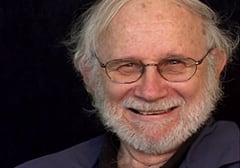Coslough Johnson Interview Script

I got started writing right after I came back from Korea from the war. I went to New York and was writing special material for some stand-up comics in the nightclubs. And after I ruined several careers there and found out they weren’t paying me anything anyway, I became a technical writer, and I wrote technical material for several years, and then I finally came out here and got into industrial film writing. And I did that for about ten years. I’ve been writing industrial films for various big corporations out here. And then just somebody said, “Hey, why don’t you write a TV show?” And I wrote a speculative script, and next thing I knew, I was writing sitcoms.
I got the job by a friend of mine, who was a friend of Rafelson. Set up an appointment for me. And I went to talk to Bob, and I guess he liked what I said or anything. In my first meeting, he gave me the rewrite assignment. I finished the rewrite assignment, and he said, “Got any other ideas?” and I threw several at him, and he said, “Go ahead and do ’em.” And that was it.
Writing one of the shows was very unique, because you had several parameters. First of all, you didn’t want to have any scene—they didn’t want to have any scene longer than a page at the most. Hopefully three quarters of a page. Secondly, you had to service four guys, and you tried to service them equally. The third thing is you had to have a storyline with a beginning, middle, and end, plus you had to leave the story open for music. So you had to do a full story in maybe twenty-two minutes, whereas without music, it would be twenty-five or twenty-six, depending, you know. So you had these parameters to fill in. So sometimes, it got a little hairy, trying to get everything in like that. And so it was much different than writing a regular sitcom.

When I wrote it, actually, the characters were so defined, that it wasn’t a problem writing for ’em, because their characters were out there. And so, if you grab in your head what that character would say, you could write for him. And a lot of that, a lot of changes etcetera were probably done on stage and in the final editing kind of thing.
They were all strong personalities. And for me, they were easy to write for because they were strong. You didn’t have to, you didn’t have—sure, some scenes, you could interchange lines, but also, when it got on the set, these guys were bright enough to change a nothing line to their personality. They did a lot of that on the set.
As far as The Monkees being any similarity with The Beatles, to me, was way off, because I came in in the second season, and by then, the guys were established characters, had nothing—there was no similarity between them and The Beatles. They were their own thing. And they were just these four guys who wanted to be in a music group who lived together who lived in this non-reality world. Which was marvelous and funny and good, and it was just straight entertainment.

The little work I did on the romps, what you would do is, in the script, you would write a list of hopefully visuals that they could do—shoot—that would fit into a romp. We didn’t really know what music they were gonna be using, because I guess that was later on when they just shoved in the music into the scripts. But, so, we wrote, we gave kind of indications of would this would be funny if we did this thing in the romp, and that’s it.
When you work in television, you know, you do other shows, they’re all based on each other. I mean, there isn’t that much different. You can look at sitcoms today and say twenty years ago, oh, that was I Dream of Jeannie, or that was—there’s no—you don’t say this was because of what happened before. It doesn’t work that way.
I had no favorites in the thing, you know. I wrote ’em, and I liked what I’ve done, did, and I liked what they did with them. And that was it, I mean there was no preference at all.
I think it had some influence on MTV, because it showed that you could do that. You could do music and show visual at the same time while the music was going on and keep interest and keep people looking at the screen, and they were the first ones to do it.

After The Monkees, I went to Laugh-In, worked on Laugh-In for several years, and then I went to Glen Campbell Show for a couple of years, and then I wrote for Sonny & Cher for about six years for them, and meantime, did about a hundred different sitcoms and a couple screenplays and a couple kids’ books and anything for money, heh. That was my career.